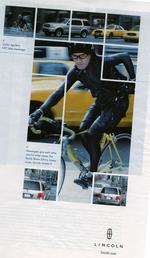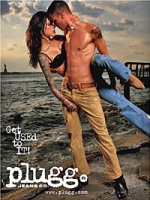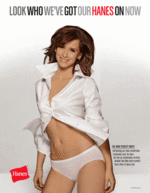With barely legal curiosity and longing, the young girl in this ad dreams of the day when a very large Durex condom will come between her and the ripped prince's burgeoning bulge her eyes wistfully yearn. With the headline, "One day you'll wish you had a Durex condom," the ad hearkens early innocence and an "I wonder what that would feel like" eagerness only experienced early in life.
Some might label the ad overly racy or a poor attempt at humor but they would be wrong. The ad is extremely honest conveying natural human desire and sexuality which, all too often, are portrayed with snickers, avoidance and censorship.
For the first time in two years, following his arrest for alleged rape, Kobe Bryant will appear in ads for Nike which will appear in Sports Illustrated. "There is no change in Kobe Bryant's contractual status with Nike. Kobe's inclusion in promotional material for the Huarache 2K5 footwear product is consistent with such Nike endorsement agreements. Nike agrees with most NBA observers that Kobe ranks among the very best players in the NBA, and his training and preparation are key elements of his game," said Nike spokesman Rodney Knox.
While this one isn't as blatant, another fast food marketers seems to want people to fornicate with its products. First, McDonald's ran a banner campaign with the headline "I'd Hit it." Now, Andrew Teman points to a Wendy's ad for its Chicken Sandwich which contains the headline "Do a Spicy Chicken Sandwich. Now, we all know there's an association between food and sex but we're not quite sure fast food falls into the category of mood-altering quisine.
In a recent ad campaign, diamond giant De Beers has modeled their advertising after Botticelli. The ad currently appears in the July issue of Town and Country. It appears as a spread with this image on the left hand side. For fun, the full Botticelli image is here. Thanks to Adrants reader Christopher Peterson.
Print advertising was on the witness stand today at the annual Association of National Advertisers (ANA) Print Advertising Forum, held at the Grand Hyatt in New York.
The keynote address presented by Mark Kaline, Global Media Manager, Ford Motor Company, and Chair, ANA Print Advertising Committee, and Robert Liodice, CEO and president of the ANA, focused on current challenges in the print advertising space and the increasing needs of advertisers for improvements in marketing accountability.
more »
While we all love a racy ad and any excuse to write about one, it seems marketers are simply creating them now in order to have them banned. Take the Plugg Jeans ad. It shows two hotties on the beach. The guy is holding a girl in a manner only seen in the confines of a photoshoot and the girl has her right hand in the guy's crotch. Hey, nothing wrong with sex but Plugg Jeans must have been smoking crack if they thought this ad would be quietly accepted by all media. Of course, that was the strategy all along according to Plugg Jeans parent company Andrew International President Andrew Kirpalani who told Ad Age, "We wanted something exciting, something provocative, it doesn't make sense otherwise to spend the money to be in Times Square."
The image was to grace a slot in Times Square but billboard owner Boston Properties declined to accept the ad as presented and asked for changes. The ad was also declined by Elle Girl and Teen People but accepted by Jane. To acquiesce to those concerned, M Media Creative Director Michael Cooper has toned down the ad a bit to unsexify the image somewhat.
UPDATE: Apparently it's now up.
No sooner do we finish debating the merits of sexually laced advertising targeting youth when we stumble upon this announcement over at AdJab stating Jennifer Love Hewitt will now be posing in Hanes ads for teenage boys so they can release their pent up...um...let us rephrase...so their girlfriends and sisters can aspire to JLH beauty by wearing Hanes panties. Love Hewitt will appear in ads for the underwear maker which debut later this month. While Adjab notes this is Love Hewitt's first foray into women's wear, we can point you to a little amusing item we wrote a couple years ago that might just debunk that fact. OK, so it's a little joke but it's still fun.

This Lincoln Navigator ad on page 41 of last Sunday's New York Times Magazine, according to bike racer, former bike messenger and Animal New York Publisher Bucky Turco, uses bike messenger's names, without permission, to promote the vehicle by attempting to create a relationship between messengers and SUVs.
Turco tells us, "Not only does this Lincoln ad hijack names of messengers who never gave permission, but just the idea that a NYC bike messengers having anything in common with a Lincoln is so far from reality. What is wrong with these idiots. Messengers hate cars. It's like using vegetarians to sell furs, it don't work. Who in the hell approved this creative?"
Bike messenger Squid, who is referred to in the ad, is a high ranking member of the NYBMA, and often referred to as "the bike messenger-general" never, according to Turco, OK'd the use of his name in this ad. Turco claims this is the second time Lincoln has run this type of creative, showing a bike messenger and then "throwing a few messenger names in with the copy for street cred."
Despite his image also appearing in an international version of the ad, without permission, a few months ago after declining to participate, Squid tells us he took no legal action. This time, he promises to do so.
 Write Nice Things Or Else It seems BP (more accurately BP's agency MindShare who crafted BP's stringent "zero-tolerance policy") and Morgan Stanley have everybody's panties in a bunch over their recently publicized ad policies stipulating their right to pull ad schedules based on disagreeable editorial content. Ad Age has skewered the announcements, writing, "Shame on BP. And shame on Morgan Stanley and General Motors and any other advertisers involved in assaults on editorial integrity and independence. By wielding their ad budgets as weapons to beat down newsrooms, these companies threaten the bond that media properties have with their audiences, the very thing that gives media their value to advertisers to begin with."
We're none too pleased either. But, for all the reaction these announcements have received, there's nothing all that new. Policies such as these have been around forever. They've just never brazenly been made public. And that's the issue.
more »
Speaking at yesterday's International Federation of Periodical and Press World Magazine Conference at Manhattan's Waldorf-Astoria, Starcom MediaVest Group CEO Renetta McCann told publisher they better get their act together and start creating more personalized content and provide "more of a screen-based entry point for consumers." She suggested video content to be deliver to cell phones and printed content to drive readers to the magazine's website.
While this really shouldn't be surprising to any magazine publisher, many at the conference, as Ad Age put it, "expressed surprise at how far behind the magazine industry appeared to be compared to the music or TV industries, which already have been modifying content for delivery over fiber optics or wireless." Get with it you magazine types.

|
|








